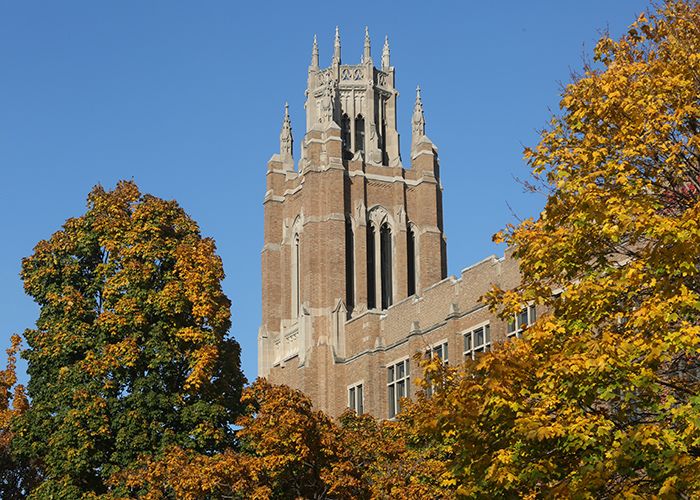 Commencement May 19, 2019
Commencement May 19, 2019
Honorary Degree: Doctor of Letters
Conferred on David Brooks
Candidate presented by: Steven Blaha, Arts '96
David Brooks, New York Times op-ed columnist, best-selling author, and political commentator, has spent his career exploring and promoting the magis within the context of this great American experiment of democracy. Within the Ignatian worldview, the magis looks to “the more” or more universal good. The magis is both centered on the flourishing of life here and now and how this life propels us towards that greater life, which is communion with God and others. Brooks undertakes this pursuit within a variety of settings.
As a journalist, Brooks critically examines contemporary consolations and desolations in American life. He has provided insightful analysis on the PBS Newshour, NPR’s All Things Considered, NBC’s Meet the Press, and in several print media sources, including The New York Times, The Atlantic Monthly, and The Wall Street Journal. Raising up for his audience the factual evidence of what is taking place, Brooks dives deeper into the why behind events and ideologies. He provides perceptive lessons on the intricacies of America’s democracy and world affairs. While probing the movements and motivating factors of American life, Brooks encourages debate, dialogue, and conversation alongside diverse partners with the hope of building societal momentum towards a more just and vibrant democracy where people might flourish.
Brooks’ commitment to this national discourse on and the pursuit of the good stems beyond news media and is evident in other areas of his work. As an Executive Director of the Aspen Institute, he is currently leading Weave: The Social Fabric Project. Brooks and his co-workers at Aspen seek to respond to major emergencies facing our nation, namely opioid addiction and the rise in suicide, along with what he argues is the underlying reality: social fragmentation. Brooks sees this fragmentation omnipresent in “the rise of distrust, the rise of alienation, the rise of loneliness, loss of a sense of common purpose and common life.” Under his leadership, Weave envisions learning from people and communities building unity and connectivity and raising these examples up in order to promote effective ways to rebuild our country’s social fabric.
Within the academy, as the Brady-Johnson Distinguished Practitioner in Grand Strategy; Senior Fellow at the Jackson Institute for Global Affairs at Yale University, Brooks co-teaches a course titled Studies in Grand Strategy, which grounds students in the thoughts and perspectives of great strategists from more than 2,500 years, encourages personal encounters with leading contemporary thinkers, and challenges students to develop creative responses to the needs of our world. Brooks is a member of the American Academy of Arts & Sciences, an honorary society founded by John Adams, John Hancock, and others, that seeks “to cultivate every art and science which may tend to advance the interest, honor, dignity, and happiness of a free, independent, and virtuous people.”
Brooks is the author of numerous books, including recently published works The Road to Character and The Second Mountain: The Quest for a Moral Life.
Because of his commitment to the promotion of national dialogue directed towards the greatest good, President Lovell, I hereby recommend David Brooks, for the Marquette University degree of Doctor of Letters honoris causa.
 Commencement May 19, 2019
Commencement May 19, 2019